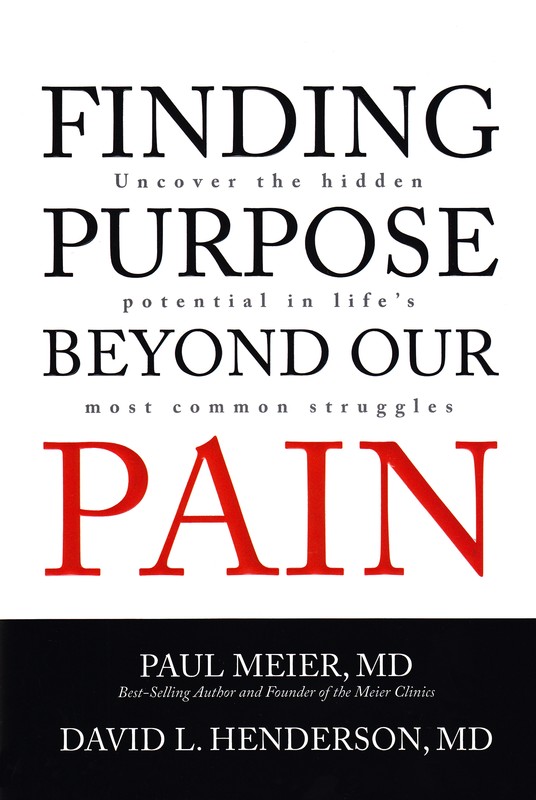Find Purpose Beyond Your Pain

Editor's Note: The following is a report on the practical applications of Paul Meier & David Livingstone Henderson's new book, Finding Purpose Beyond Our Pain: Uncover the Hidden Potential in Life's Most Common Struggles, (Thomas Nelson, 2009).
You can't escape pain in this fallen world, no matter how hard you may try. But neither do you have to suffer in vain. God always has a purpose for allowing pain to enter your life - a purpose that will result in something greater than the pain itself.
Here's how you can find purpose beyond your pain:
Realize that your pain will lead to new growth for you. God promises that He won't have you go through pain without using it to help you grow. If you trust Him, He'll take whatever painful circumstances you encounter and use them to accomplish good purposes in your life. Even pain that seems to have no purpose (such as that which comes from disease, abuse, natural disasters, and wars) can help you grow in positive ways when you trust God with your pain.
Deal with injustice. The pain of injustice helps you learn to trust God's sovereign control in bringing about your good. Accept the reality that you don't have a right to a comfortable, easy life and that you're not entitled to have everything go your way. Injustice strikes the righteous just as much as other people in our fallen world. However, remember that God never causes evil; He only allows it sometimes, to accomplish good purposes. Since He loves us, He has given us free will, and sometimes that results in evil.
So injustice is any act committed against another person that seeks to violate God's good and perfect will for that person's life. But God will make every injustice right, whether in this life or the next. Be confident that no injustice can change the fact that you are God's child. Make a habit of thanking God regularly for His work in your life. Keep a record of injustices that God has worked out for good and other blessings He has given you. Remember that justice deferred is not justice denied. Never give up hope that God will right the wrongs you suffer.
Deal with rejection. The pain of rejection gives you the freedom to live in the light of transparency and find true acceptance from God, yourself, and other people. God already knows everything about you and still chooses to love you completely and unconditionally. So you don't need to strive to try to earn His love, or worry that your sin prevents Him from loving you. Let that knowledge fill you with the confidence to accept yourself. Ask God to help you see yourself in the light of His love. Be open and honest in your relationships with other people, pushing past your fear of rejection to reach out and develop loving bonds with them.
Allow yourself the freedom to make mistakes in your relationships, and extend mercy and grace to others when they make mistakes. When others reject you, learn what you can from the experiences, but remember that it may be more about them than it is about you. Also remember that other people's opinions aren't nearly as important as God's opinion of you. Ground your view of yourself in your relationship with God to keep it consistent and stable despite whatever rejection your may encounter from others.
Deal with loneliness. The pain of loneliness helps you truly appreciate the health and loving relationships in your life - especially your most important relationship, with Jesus Christ. Pray for the strength to overcome obstacles to building strong relationships, such as your comfort, success, pride, preferences, and time. Prioritize your relationships by making plenty of time for them in your schedule. Aim to know yourself and other people well.
Ask God to help you focus on what's best for your relationships, rather than just what you think is best for you personally. But don't rely on human relationships to define you or validate you, and don't try to use them to fill voids in your life that only God can fill. People will sometimes let you down. But you can be confident in your relationship with God, who will always be there for you. Base your identity in the fact that you're God's child, connected to Him forever through Christ. In Christ, you will never really be alone.
Deal with loss. The pain of loss will illuminate the most valuable possession you have (and one that you will never lose) - your inheritance as God's child. You can't hold onto the things in this world temporal world forever, so the pain of loss is inevitable. But you can prepare for it by asking yourself: "What do I have to lose in this life?", "What do I have to gain in this life and the next?" and "Are the gains I have listed worth the sacrifice?". Don't compare your own losses to those suffered by others. Instead, simply be honest with yourself and God about the reality of your pain when you lose something you value.
Take whatever you've lost (time, significance, love, luxuries, control over your circumstances, etc.) and place it in God's hands, trusting Him to help you. Consider what good can come out of your loss, such as gaining a clear direction or valuable opportunity you wouldn't have otherwise had. Realize that change isn't your enemy; the losses you suffer may be a part of beneficial change in your life. Thank God each day for the blessings He has given you, and ask Him for the strength to be content whatever your circumstances. Invest in what has eternal value, remembering that your losses in this life will be worth the eternal returns.
Deal with discipline. The pain of discipline will help you grow strong physically, spiritually, and emotionally. God will build a strong character within you through discipline. You can trust that His discipline is always in your best interest and intended for greater purposes in your life. God loves you too much to let you remain as you are; He wants you to keep growing as a person. So don't settle for less.
When you find yourself suffering the consequences of poor choices, admit your mistakes and let the experience humble you and motivate you to grow. Find some friends who can teach, encourage, and challenge you to become more like Christ. Confess and repent of your sins regularly in prayer. Ask God to help you become more disciplined in areas such as: prayer, meditation, fasting, submission, service, and public worship. Pray that God will bring your desires in line with His desires for you.
Deal with failures. The pain of failures will help you understand true success, which is contentment in life. God will use even your greatest failures for His glory if you'll turn them over to Him. Ask God to give you His perspective on the situations in which you experience failure. Learn from your failures, and let them motivate you to rely on God more. Make Christ the source of your satisfaction, enjoying His constant presence with you no matter what happens from day to day.
Deal with death. The pain of being reminded of death's reality will equip you to focus on fulfilling your true purpose for living. Prepare yourself now for facing God in eternity, since you never know when you'll have to leave this life on Earth. Live fully and responsibly, doing everything you sense God leading you to do each day that you're alive. Don't let fear keep you from fulfilling God's purposes for your life. Relinquish control over every area of your life to Christ, trusting Him to guide you both now and when you die. Rejoice that Christ's presence is sufficient, and the promise of heaven is secure.

Paul Meier, M.D., a nationally recognized psychiatrist and founder of the Meier Clinics, is a frequent radio guest and best-selling author or co-author of more than 80 books, including Love Is a Choice, Happiness Is a Choice, Don't Let Jerks Get the Best of You, Mood Swings, and Love Hunger. Meier also collaborated on the best-selling Millennium series, which includes three futuristic novels. He holds fives degrees, including an M.D. from the University of Arkansas College of Medicine, a psychiatric residency at Duke University, and a seminary degree from Dallas Theological Seminary. Paul is married to Ann and the proud father of six children and two grandchildren.
David Livingstone Henderson, M.D. completed his medical training in Ohio and his psychiatric residency in South Carolina. He is a board certified psychiatrist currently serving full time at the Meier Clinic in Dallas, Texas. David is an adjunct professor of biblical counseling at Dallas Theological Seminary and an Advisor to the Board of Directors of ROCK International, a worldwide organization designed to provide relief to children suffering from the effects of disasters and abuse. His research and clinical interests include anxiety, depression, chemical and behavioral addictions, and the effects of worldview and spirituality on mental and physical health. He and his wife, Angela, have two young children.
Original publication date: December 18, 2009
Originally published December 18, 2009.







